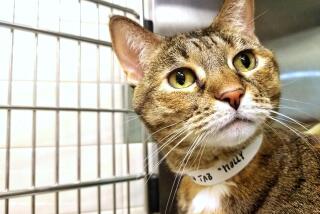Vet Can Tell by Touch if Kitty Is Expecting
- Share via
Q: Last week, my female cat, Edie, was in heat and got out of the house. She came back two days ago and seems fine, except that she is hungry all of the time. How can I tell if she is pregnant? I have heard of mismate shots for dogs. Are there such shots for cats? If so, when should I get Edie taken care of?
Paula Hansen,
Garden Grove
A: Pregnancy determination in your cat is generally done between three and four weeks after mating. The feti are formed by 25 days and can be felt by palpation of the abdomen by your veterinarian. Prior to three weeks of pregnancy, it is very difficult to know if your cat is pregnant. You may notice some behavior changes or loss of appetite, but this is not very common. X-rays can be taken after six weeks when the skeletons are forming, but radiography is usually not recommended. An ultrasound test can be done and has much less potential for harm than X-rays do.
Mismate injections can be given to prevent implantation of the ovum or egg but should be done within the first 24 to 40 hours after mating. The medication is an estrogen but should be used with care. Side effects of these injections are a longer heat cycle and an increased risk of uterine infection because of the increased duration that the cervix remains open to bacteria. If an infection develops (pyometra), an ovariohysterectomy (spaying) may need to be done.
Occasionally a false pregnancy may occur, caused by an inappropriate level of the hormone progesterone. Your cat could go through signs of being pregnant, even occasionally developing milk. You should have your cat examined by your veterinarian to determine if she is pregnant and which options you should choose.
Q: My dog, a collie, has been overweight for years and I have had a very difficult time getting weight off her. She seems to be active and doesn’t eat very much, yet never seems to lose any weight. I walk her once a day and feed her once a day. Any suggestions?
Debbie Wright,
Los Alamitos
A: Obesity in dogs can be just as serious as in people. Extra weight puts a strain on the heart and lungs and can increase the chance of injury to the joints or back. I recommend a thorough examination by your veterinarian, including a complete blood profile, especially thyroid levels. A controlled diet or a prescription diet R/D (reducing diet) should be started. You should set a target weight for your pet and stay with her program. Exercise is important but should be kept within her limits of size and age. Weighing your pet weekly will help keep track of her progress. Remember, no snacks or table foods, which means the whole family must cooperate or the plan will fail. Good luck.





